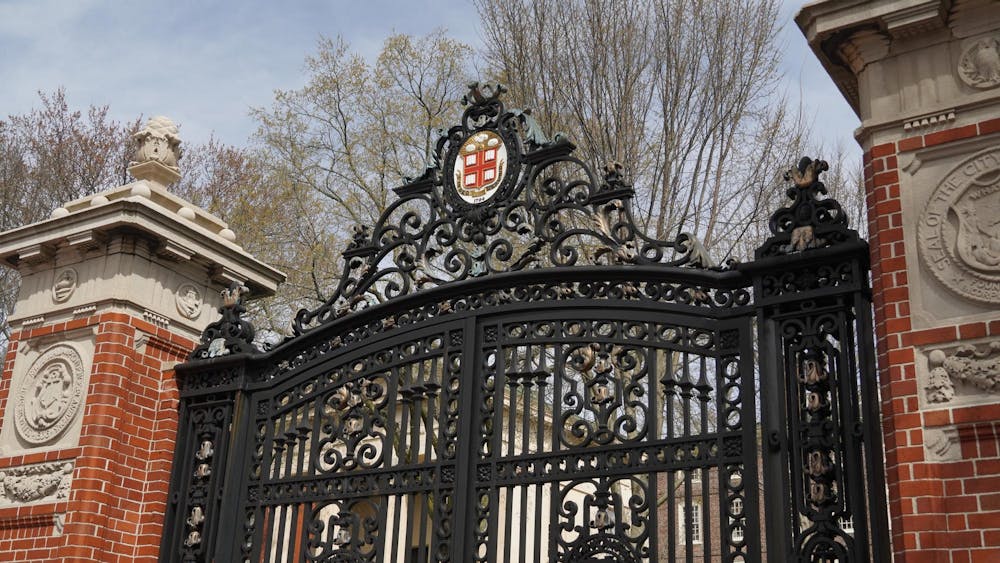Follow The Herald’s latest coverage on how the Trump administration is impacting Brown here.
Brown, eight other universities, the Association of American Universities, the American Council on Education and the Association of Public and Land-Grant Universities filed a lawsuit Monday in an attempt to stop funding cuts by the U.S. Department of Energy.
The planned cut, which would affect administrative “indirect costs,” would result in an over $2 million annual loss for Brown, according to a court filing. The plaintiffs described the actions as “flagrantly unlawful” and said that the cuts “devastate scientific research.”
The DOE announced Friday that they would limit financial support of universities’ indirect research costs to 15% — an action they said is “projected to generate over $405 million in annual cost savings for the American people” and delivers on Trump’s “commitment to bring greater transparency and efficiency to federal government spending.” The average rate of indirect costs at universities is currently over 30%, according to the DOE press release.
In fiscal year 2023, DOE financed $7.7 million of research and development expenditures at Brown. The DOE funds research in “energy production, energy use, fundamental energy sciences, environmental management and defense nuclear nonproliferation” according to their website.
This suit mirrors a similar complaint filed by Brown and other universities in February alleging that cuts to indirect costs on National Institutes of Health grants were unconstitutional. A federal judge later ordered an injunction on the cuts.
In a Tuesday letter to the Brown community, President Christina Paxson P’19 P’MD’20 and Provost Francis Doyle explained that “Brown felt it was important to become a named plaintiff in the lawsuit … to advocate against the destructive impacts on innovative research that is advancing everything from medical imaging and fast-charging electronics, to security systems for banking and personal data.”
In the letter, Paxson and Doyle described DOE’s funding cuts as “troubling and unsettling” and pointed out that at Brown, DOE funding supports research in artificial intelligence, quantum information science and nuclear technology.
Vice President for Research Greg Hirth ScM’87 PhD’91 submitted a declaration in the lawsuit on behalf of Brown, attesting that the reduced indirect cost rate ceiling and termination of grants will have “devastating effects on Brown’s research initiatives and the progression of science.”
In the declaration, Hirth added that the endowment “cannot make up for the significant gap in funding a reduction in (facilities and administrative costs) or total termination of DOE awards would create.”
“The endowment provides an essential source of support for the University’s financial aid, faculty salaries and academic and co-curricular programs and consists of over 3,800 unique funds that are legal contracts given as charitable gifts by alumni, parents, students, and friends of the University,” Hirth wrote. “These are restricted by law and purpose for their designated use, and cannot simply be reallocated.”
With “no other identified source of funds,” Brown will have “little choice but to significantly scale back the amount of research it conducts,” Hirth wrote.
In addition, Hirth wrote that Brown would have to scale back on staff, eliminating “positions that support the research enterprise and facilities, such as administrators, research coordinators, lab managers, custodial staff and security officers.” The Herald previously reported that some researchers have already had to lay off staff from their projects due to NIH grant cuts.
In his declaration, Hirth pointed out that in the 2024 fiscal year, Brown received over $253 million in federal funding — 19% of Brown’s operating revenue — with over $69 million in indirect costs. For the 2025 fiscal year, that number is projected to grow to $300 million, with $73 million in indirect costs.
According to a statement from the AAU, the APLU and the ACE, these cuts would have an “immediate and dire impact on critical energy, physical sciences and engineering research nationwide” and set a “very dangerous precedent that could be used to undermine federal investments in research at many other federal agencies.”
Last Thursday, University officials announced that the Department of Health and Human Services had expanded a Title VI investigation — originally reviewing the Warren Alpert Medical School — to include the entire University, for the time period from Oct. 7, 2023 to the present. HHS originally launched the investigation into Warren Alpert in February for alleged antisemitism at a May 2024 protest at the medical school’s commencement ceremony
“We are confident that our actions in response to the May 2024 protest — which occurred outside the church where the medical school ceremony was held and on an adjacent public sidewalk — were in compliance with Title VI,” the Thursday email reads.
These actions come in the wake of a planned $510 million funding freeze over alleged antisemitism on campus and the University’s diversity, equity and inclusion initiatives, a White House official told The Herald. The freeze was announced April 3, but the University has not yet confirmed receipt of a formal notification from federal officials regarding the freeze to The Herald. This suit against DOE does not mention the Trump administration’s planned $510 million federal funding freeze to Brown.
At least $8 million of NIH grants funding Brown’s research have been cut since the Trump administration took office, The Herald previously reported. Gender- and diversity-related terminology was cited as a reason for several of these funding cuts. It is unclear whether these cuts are related to the planned $510 million federal funding freeze.
An HHS spokesperson previously told The Herald that the agency “is partnering with other federal agencies to conduct a comprehensive review of grants awarded to universities that have failed to protect students from discriminatory behavior.”
Paxson has affirmed Brown’s commitment to responding to federal actions threatening “academic freedom” multiple times over recent weeks. In a March 20 letter to the campus community, Paxson wrote that if the University faced federal actions threatening its academic and operational capabilities, Brown “would be compelled to vigorously exercise our legal rights to defend these freedoms.” At a faculty town hall last Tuesday, Paxson characterized Columbia’s compliance with White House requirements as ineffective.

Elise Haulund is a science & research editor and sophomore from Redondo Beach, CA. Concentrating in English and biology, she has a passion for exploring the intersection between STEM and the humanities. Outside of writing, researching and editing, she enjoys ballet-dancing, cafe-hopping and bullet-journaling.

Claire Song is a university news and science & research editor for The Herald. She is a sophomore from California studying Applied Math-Biology. She likes to drink boba in her free time.





